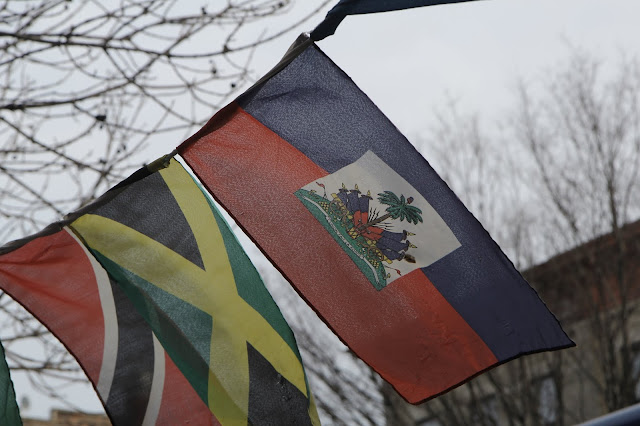Brooklyn activists speak about political crisis in Haiti
 |
| Haitian flags are a common sight in the Brooklyn neighborhood of East Flatbush. |
Brooklyn activists are calling for local Haitian-American politicians to speak out about the political crisis in Haiti.
“I was with the Haitian activist group Komakoda at a rally. But we didn’t see any of the Haitian-American elected officials out there,” said Anthony Beckford, an East Flatbush resident who is running in the 45th Council District race. “They should be the first ones renting buses and going to DC. But they’re not doing it.”
Dahoud Andre, a member of the group Komakoda, said Komakoda was founded in 2014 to protest against the presidency of Michel Martelly. He said it is particularly the local Haitian elected officials’ support of Hillary Clinton that makes them upset.
“Martelly was handpicked by the Clintons at the time Hillary Clinton was Secretary of State and because of the Clintons’ corruption in Haiti before and after the earthquake, they needed someone to cover for them and this is why they went out and got Martelly,” said Andre, 52, originally from Haiti. “Mathieu Eugene on the City Council and Rodneyse Bichotte on the State Assembly are both lackeys who back Martelly.”
Andre said that during the 2016 election when Komakoda was fighting against the Clintons to stop Hillary Clinton from getting to the White House, both Eugene and Bichotte also supported the Clintons.
Bichotte posted a picture of herself with Clinton in 2016 on Twitter with the caption “Voted! I’m with her!,” while Eugene was listed on Hillary Clinton’s endorsement list in 2015.
In February, violent unrest broke out through Haiti as people stormed the streets, demanding to know what happened to the $3.8 billion Venezuela gave the Haitian government for infrastructure and economic development.
Haiti has been plagued with blackouts and massive fuel shortages due to a major energy corporation ending shipments to the country in February of last year.
At the center of the people’s accusations is the current president, Jovenel Moïse and his party, the PHTK.
Local Haitian-American activists like Albert St. Jean are actively working to create dialogue between people in Haiti and the Haitian population in East Flatbush.
“This is a completely organic movement and it’s purely, indisputably the will of the people,” said St. Jean, a local Haitian-American activist. “They want this guy to go.”
The Haitian people have accused Moïse and former president Martelly of diverting and misusing the Petrocaribe oil money that Venezuela has been providing to Haiti for over 10 years.
Through the Petrocaribe agreement, the Haitian government will pay for 60 percent of the oil they receive from Venezuela, with the other 40 percent possibly being financed for a 25-year-period at a 1 percent interest rate. In turn, this would allow the government to invest the saved money in resources that benefit Haitian society.
This potential squandering of massive funding is not the only factor marring Moïse’s presidency.
The U.N. and human rights organizations are investigating a 2018 massacre of 21 people in the Port-au-Prince neighborhood of La Saline. The Haitian police attributed it to gang violence, but St. Jean said that the police murdered them for speaking out against government corruption.
It is the specific role of the U.S. in the Haitian crisis that is at the core of the activists’ clarion calls.
“There needs to be pressure put on to political and elected officials, particularly those that are in Congress, to call for the U.S. not to tamper with Haitian politics,” St. Jean said.
Beckford said that the local politicians need to go to the capital to speak out against the U.S. meddling in Haiti.
“Josue Pierre and Rodneyse Bichotte, whose office is a few blocks down, have no excuse. They do not come out in the community. They do not speak out,” said Beckford, 37. “In regards to the situation in Haiti, they’ll only show up when the cameras are around.”
Pierre said that he was not invited to the protest and that as a Haitian-American, it’s difficult to have an opinion on something he doesn’t fully understand.
“When you live here as a Haitian-American, if you’re not traveling back and forth and seeing things for yourself in a very clear, vivid way, it’s very hard to truly understand what’s going on politically in Haiti,” said Pierre, the Chairman of the 42nd Assembly District Statement Committee. “I have to question where I’m getting the information from and it’s hard to know what’s what because I don’t live in Haiti.”
The purpose behind the U.S. installing a president favorable to them was in order to hurt Venezuela, according to St. Jean. He said Haiti would have been an even better market for Venezuela if it had become stable and elected leftist politicians, who allegedly won the election over the U.S. backed-Moïse.
One of the factors making some of the Haitian community in East Flatbush silent is the potential repercussions should they speak out.
“I know that people in Brooklyn are very scared to go back to Haiti because a lot of Haitians communicate through WhatsApp and we get a lot of feedback and information through it,” said Andre Peck, Executive Director of the Haitian-American Community Coalition in East Flatbush. “Some of the information can be very scary. If you reside here and you go back to Haiti, you can actually be seen as a target.”
Local activists see it as their duty to advocate for people in the Haitian community who are afraid to speak out.
This article was originally published in Street Hype Newspaper.



Comments